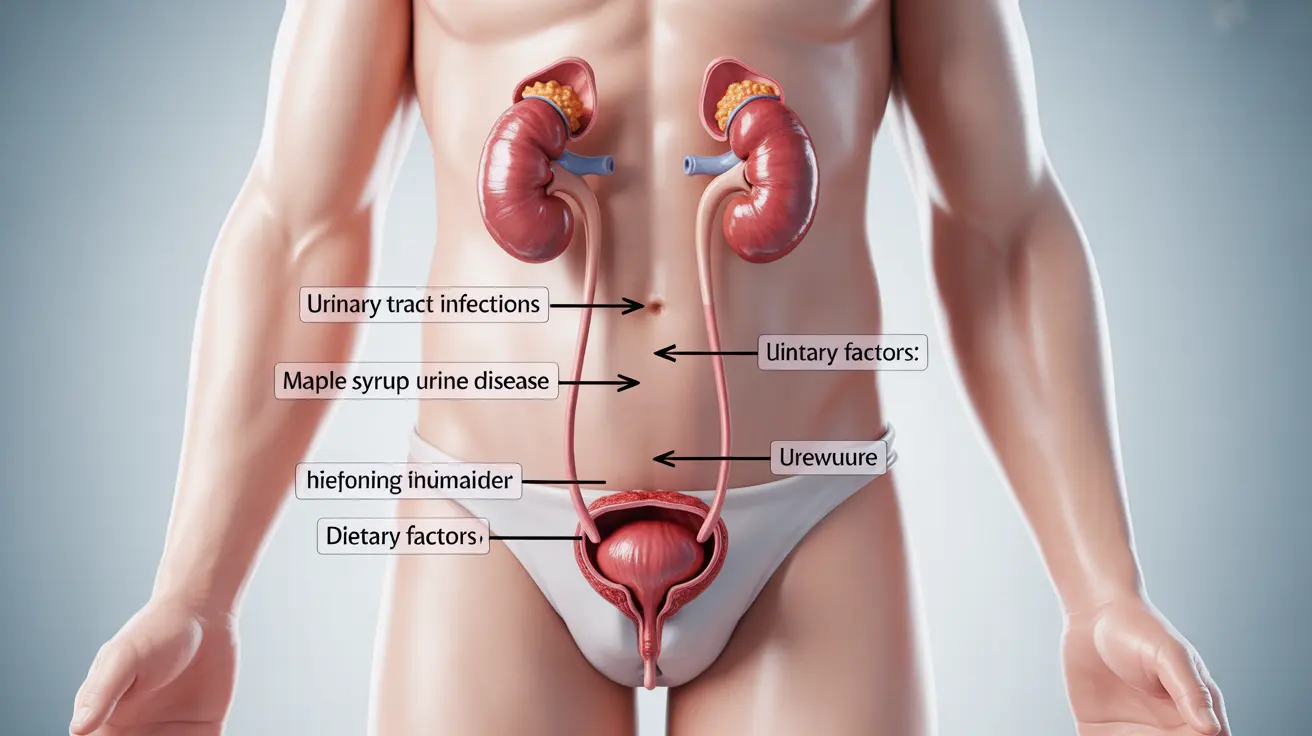Noticing changes in your urine's smell can be concerning, especially when it takes on a sweet or fruity odor. While diabetes is a well-known cause of sweet-smelling urine, several other medical conditions can create this symptom. Understanding these alternative causes and knowing when to seek medical attention is crucial for maintaining your health.
This comprehensive guide explores the various reasons behind sweet-smelling urine unrelated to diabetes, helping you identify potential underlying conditions and appropriate next steps for diagnosis and treatment.
Common Non-Diabetic Causes of Sweet-Smelling Urine
Several medical conditions and factors can cause your urine to smell sweet, even if you don't have diabetes:
Urinary Tract Infections (UTIs)
UTIs can alter urine odor due to bacterial presence and chemical changes in the urinary tract. Besides a sweet smell, common symptoms include:
- Frequent urination
- Burning sensation during urination
- Cloudy or dark urine
- Lower abdominal pain
- Fever in severe cases
Maple Syrup Urine Disease
This rare inherited condition affects how the body processes certain amino acids, resulting in urine that smells like maple syrup. Early detection and dietary management are crucial for preventing serious complications.
Fanconi Syndrome
This kidney disorder affects the body's ability to reabsorb important substances, potentially leading to sweet-smelling urine and other symptoms like bone problems and muscle weakness.
Dietary and Lifestyle Factors
Sometimes, sweet-smelling urine can result from what you eat or drink:
- Vitamin B6 supplements
- Certain medications
- High-sugar foods
- Dehydration
- Specific fruits and vegetables
Warning Signs and Symptoms
Pay attention to these additional symptoms that may accompany sweet-smelling urine:
- Changes in urine color or clarity
- Increased urination frequency
- Pain or discomfort while urinating
- Unexplained fatigue
- Persistent thirst
Diagnostic Process
Healthcare providers typically use several methods to determine the cause of sweet-smelling urine:
- Urinalysis
- Blood tests
- Genetic testing (if hereditary conditions are suspected)
- Physical examination
- Medical history review
Treatment Approaches
Treatment varies depending on the underlying cause:
For UTIs
Antibiotics are typically prescribed, along with recommendations to increase fluid intake and practice good hygiene.
For Metabolic Conditions
Management may involve dietary modifications, supplements, or specific medications depending on the exact condition.
For Lifestyle-Related Causes
Simple adjustments to diet, hydration, and supplement use may resolve the issue.
Frequently Asked Questions
What are the common causes of sweet-smelling urine besides diabetes?
Common non-diabetic causes include urinary tract infections, maple syrup urine disease, Fanconi syndrome, certain medications, vitamin B6 supplements, and dietary factors. Dehydration can also concentrate urine, making its natural smell more noticeable.
How can urinary tract infections lead to sweet-smelling urine and what are the symptoms?
UTIs can cause sweet-smelling urine due to bacterial metabolism and changes in urine chemistry. Common symptoms include frequent urination, burning sensation, cloudy urine, lower abdominal pain, and possibly fever.
When should I see a doctor if my urine smells sweet but I do not have diabetes?
Seek medical attention if sweet-smelling urine persists for more than a few days, or if it's accompanied by pain during urination, increased frequency, fever, back pain, or significant changes in urine color or clarity.
What tests are used to diagnose the reason for sweet-smelling urine?
Doctors typically start with urinalysis and may proceed with blood tests, genetic testing, and physical examination. They'll also review your medical history and current medications to determine the underlying cause.
How is sweet-smelling urine treated depending on its underlying cause?
Treatment varies by cause: UTIs require antibiotics, metabolic conditions may need dietary changes or specific medications, and lifestyle-related causes can be addressed through hydration and dietary modifications. The key is identifying and treating the underlying condition rather than just addressing the symptom.




